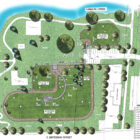Business & Economy
East Lansing bars respond to on re-openings and the spread of COVID-19
|
The typically loud and rambunctious crowds in East Lansing bars have been replaced with control and regulation, rendering a dramatic change in the bar scene since the start of the COVID-19 pandemic. “Before [the pandemic], it was very laid back, it was a fun environment to make good money at,” said Lauren Dix, server at Beggar’s Banquet. “It’s just a little bit tenser and there are not as many people coming in.”
After the COVID-19 pandemic forced Michigan State University to end in-person classes, hundreds of students flocked to the local bars in East Lansing. Not long after, the lack of social distancing and mask-wearing at many bars and restaurants caused many of them to shut down or implement new rules in order to minimize the spread of the coronavirus.
Four months after the pandemic reached East Lansing, many bars and restaurants attempted to re-open after Gov. Gretchen Whitmer issued an executive order on June 1 that allowed them to begin conducting business again. Some were able to open successfully, relying on curbside pickup and takeout orders to make up for the revenue that they lost while being forced to close down but, others, however, were not as successful.






